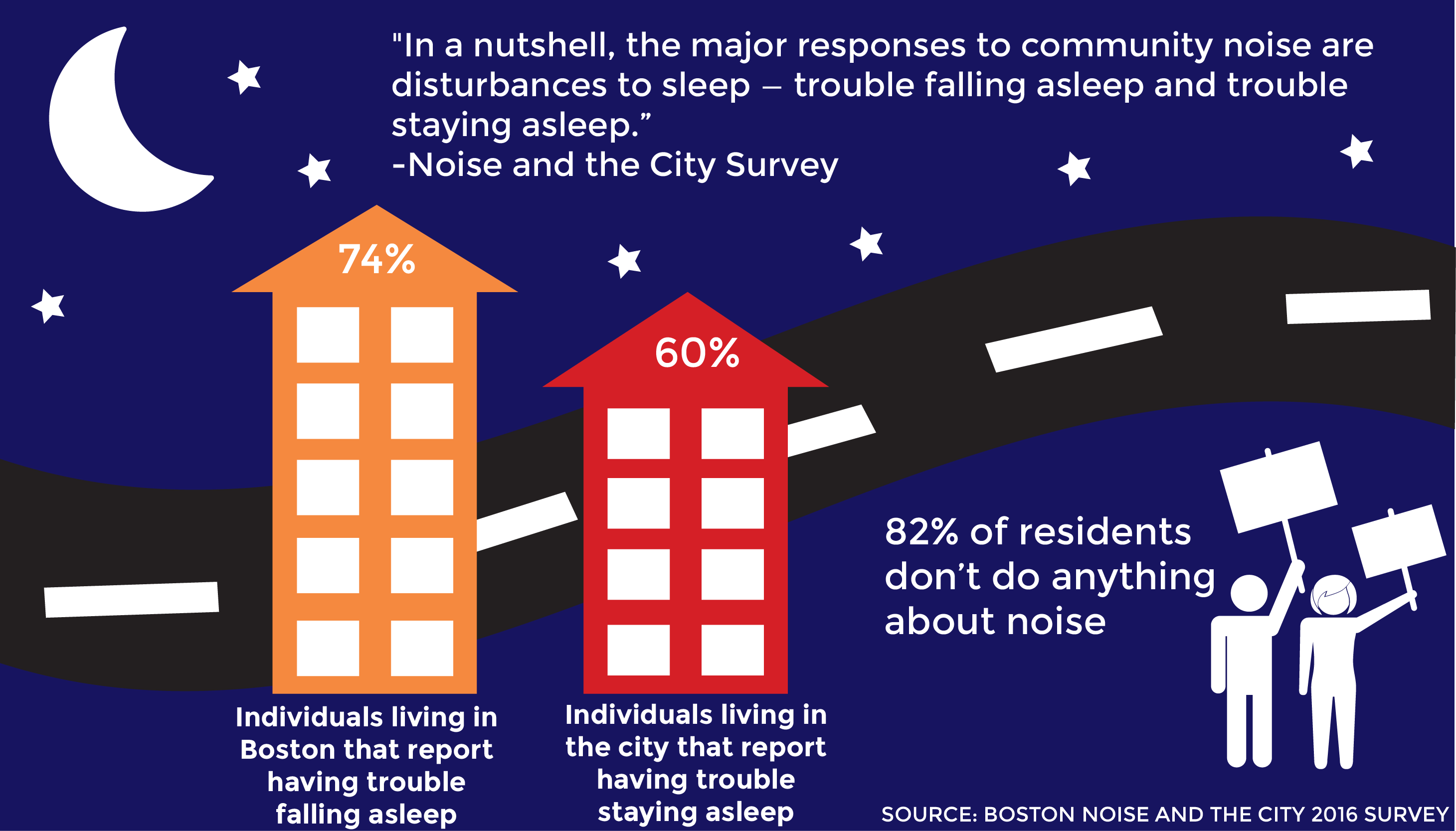
Over 1,000 Boston residents participated in a survey about noise in the city, and researchers found noise levels in Boston affect sleep status, according to the 2016 Greater Boston Noise Report, released Monday.
While the majority of participants surveyed in the report did not find that noise levels affected their physical or mental health, they did report that noise negatively impacts their quality of sleep and relaxation.
The report stated that 74 percent of individuals living in the City of Boston have trouble falling asleep, and 60 percent report having trouble staying asleep.
“Trouble concentrating and trouble relaxing were also among the highest reported negative impacts resulting from exposure to neighborhood sound,” according to the report.
Erica Walker, a doctoral candidate at the Harvard T.H. Chan School of Public Health and the lead researcher on the project, conducted her research by evaluating the levels of noise around various Boston neighborhoods and surveying residents.
While living in a noisy apartment building, Walker said, her health suffered as a result of the noise levels. After going online and discovering thousands of other people reported distress because of noise, Walker switched her master’s thesis project to building a noise model for a small community near a busy interstate in Somerville.
“I used to live in an apartment below a family who had two small children,” Walker said. “The children used to run the length of their apartment for hours a day and my health suffered terribly because of it.”
Walker said she conducted her research in three parts. First, by measuring sound across 400 sites in the city, then by administering the Noise Survey to understand residents’ responses towards community noise and finally by interviewing community residents about sound levels in their neighborhood.
While conducting her research, Walker spent months traveling the city and measuring sound levels at different sites for up to hours at a time, which she said was both rewarding and difficult.
“During the summer it was great — people would come up and talk to you and share their stories; some even offered treats or a chair. The support in the field was incredible,” Walker said. “However, during the wee hours of the morning or during really cold days, it was either scary or unbearable.”
After conducting her research, Walker produced “report cards” for each Boston neighborhood, which use statistical models to analyze key variables that most positively and negatively impact environments of Boston neighborhoods, according to the report.
“The idea is to give the Boston community the information, and see what they want to do with it,” Walker said.
Walker said she intends to give the report cards to the Boston City Council to encourage them to address noise complaints in the city.
The Allston/Brighton and Fenway areas, which surround the Boston University campus, both scored a D- on their report cards. Allston/Brighton has the second highest level of noise complaints in the city, according to the report card.
Marcos Luna, a professor at Salem State University who worked alongside Walker in her research, wrote in an email that although noise affects public health, there is very little being done systematically to actually map sound in Boston or on a regional scale.
“Our work is unique … Not just for being rare, but also for looking at other measures of sound beyond the A-weighted (dBa) measures that are typically used to assess sound,” Luna wrote. “This research considers other measures of sound that may have very real public health significance.”
Several Boston residents admitted to experiences problems having to do with noise levels in the city, but felt the problem is unresolvable.
Hankyeong Im, 26, of Allston, said her neighbors often host noisy parties and play music loudly.
“I just use headphones,” she said. “You can’t do anything about it.”
Steve Robson, 64, of Allston said after living in Back Bay and the South End for 19 years, his hearing has been significantly affected by noise levels.
“[City Council] should try and make every effort to reduce the noise so it doesn’t damage hearing,” Robson said.
Hannah Roberts, 24, of Back Bay, said she’s annoyed by noise in her neighborhood, but she feels discouraged from making noise complaints.
“Overall, I find Boston to be loud, but there’s nothing you can really do about it,” Roberts said. “I don’t want to be one of those people that makes noise complaints all the time.”






















































































































